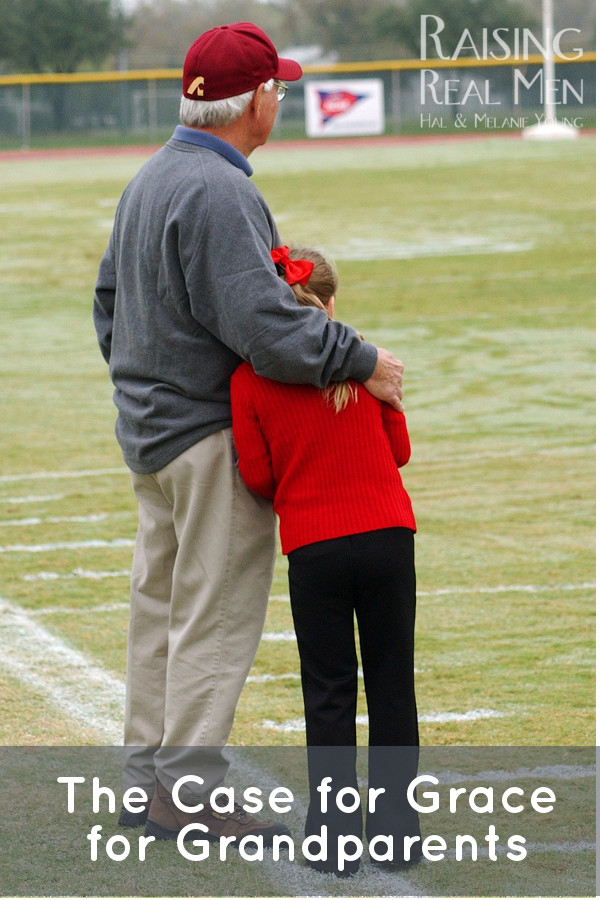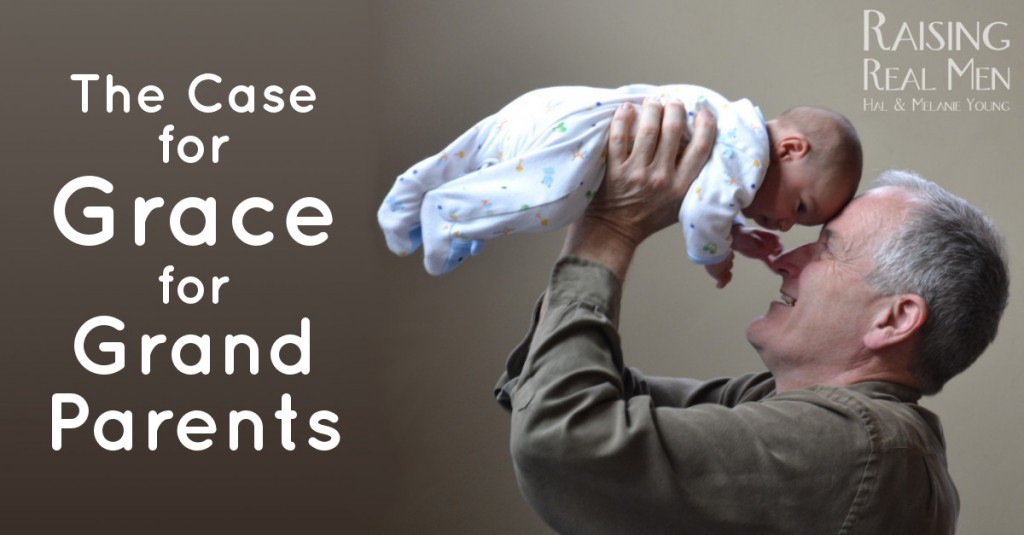A Case for Grace for Grandparents
Several times recently, friends have told us that they are just done with their parents. They’ve had repeated disagreements and arguments over the children and their family’s lifestyle choices. They’re so annoyed with the older generation, they just want to back out of the relationship.
This is kind of a shock to us. We grew up in the South where if you didn’t take your mom’s phone calls, she’d show up at your house and stand there on your porch until you did! “Family is family,” people would say when we were growing up.
“But, you don’t know my family!”

True. There are truly dysfunctional families and frankly, broken personalities to deal with, sometimes. We’re not talking about the horrible situations that some of you face where you just must walk away. We have seen some families in that shape, sadly. An abuser, for example, has broken the family trust and has no right to access to anyone.
For most of our friends, though, it’s not a matter of pathology or persecution, but a series of disputes about authority, discipline, household management, and respect for one another. Many of these things could be resolved! Breaking off contact is the death penalty of relationships, and it should only happen in the most extreme circumstances.
If you find yourself exasperated and chafing in your extended family relationships, consider this:
The way you relate to your parents and in-laws now is teaching your children how to relate to you when you’re the grandparent.
Stop and think about that a moment.
By the time your children have children, things will be different than they are now.
Dietary advice will change. When we were children, our parents were told to choose margarine over butter – it was so much healthier! When our children were little, research was just surfacing that trans-fatty acids in many margarines were actually more dangerous than butter! Depend on it, something you confidently feed your children now will fall out of favor when your grandchildren come along.
Safety advice will change. When we were children, car seats for kids were simply boosters to let them see through the windows. Seatbelts were optional and kids routinely rode unrestrained in the back of the station wagon or the bed of Dad’s pickup truck. When our first child was born, car seats were mandatory and had multiple attachment points; by the time our youngest came along, parents were required to keep children in booster seats until they were eight years old! When your time comes to load up grandchildren, who knows what contraption will be standard equipment? Will you find it irritating or frustrating to submit to new expectations that seem unrealistic, panicky, and alarmist?
Baby care advice will change. We’ve seen this ourselves over the twenty years we had babies in our house. First, they told us to always put a baby to sleep on his stomach, because he might aspirate his spit up and die. A few years later, the experts said no, always put a baby to sleep on his side; otherwise he might aspirate spit up or have SIDS and die. A few years after than, they said babies should always be put to sleep on their backs … or they might die. The advice was always earnest and urgent and ever so certain … this time.
Dear Future Grandparent: Trust us, you’re going to think the new advice is all a bit silly. After all, your kids did fine! Your children, though, will do some things differently with their kids than you did with yours. When they do, don’t you want them to have patience with you when you don’t quite get it?
Yet, we hear folks threatening to cut their parents off for just that kind of thing:
- “My mom took our children to the bank instead of taking them right home. I know I shouldn’t have let them ride with her! How do I even know she kept an eye on them?”
- “His mom just fed them junk food at her house. She gave them popsicles with artificial colors. I can’t believe she’d give them that kind of poison!”
- “Their grandma let them watch cartoons and then took them to a movie we hadn’t approved in advance. I’m done with this!”
We get it. We really do. DISCLOSURE: We’ve said some of those things ourselves! We’re a little (well, a lot!) older now and our perspective has changed. Now we realize there are some very good reasons for choosing to overlook these things.

We want our kids to know that relationships are worth fighting for. Every relationship between two sinners is going to involve conflict and compromise. We want our children to understand that by the time they’re adults. We don’t want them to be quick to walk away – not from us and not from their mate.
We want our kids to understand that there is more to life than the body and that relationships are more important than food. The Word tells us that
Not what goes into the mouth defiles a man; but what comes out of the mouth, this defiles a man.
When we put what we have chosen to eat or not eat above our relationships with our family, above kindness and courtesy, we’re teaching our children the opposite of this verse.
It’s true that some circumstances are so serious, like a life-threatening allergy, that you have to handle them as medical issues and draw strict boundaries. And to be fair, it seems that some of these allergies are more common now than when we were kids … that’s real.
Much of what causes disagreement doesn’t rise to that level, though. Is it good for kids to have a diet rich in artificial colors or flavors? No. Will they be seriously hurt if they encounter them occasionally at Grandma’s house? No, again.
We want our children to learn tools for dealing with difficult people and uncomfortable situations. We travel a lot and we’ve enjoyed hospitality from people of all sorts. Sometimes, we’ve looked at our plates and had to decide – are we going to be picky and embarrass these kind hosts, or will we be gracious guests and ignore our usual preferences for an hour? When a conversation steers into controversies over politics, religious distinctives, or other areas of disagreement, have our children seen us answer softly and steer clear of arguments and offenses for the sake of relationships?
When our children see us behave like a Christian — with self-control, gentleness, and thankfulness — and when they watch us control our tempers and mouths when we’re provoked, we’re teaching them how to behave when they have challenges with other people. One day, no doubt, we’ll be that “other” person!
We want our children to learn to set loving boundaries. When we navigate awkward relationships in our family well, our children learn how to do the same. They learn how to refuse to be baited, how to change the subject, how to say no to a problematic invitation, how to tell someone to stop being a bully. and they see how to do those things like a Christian.
We want our children to respect their elders. Although it’s tempting to feel like our generation is the first to really be on top of it all, the Word of God tells us to honor our fathers and our mothers, to submit to the elders of the church, and to be subject to those in authority over us. When our kids see us honor our parents even when we disagree with them, they learn to respect the position and experience of their elders.
Ultimately, we want to show our children how we want to be treated when we’re the grandparents and they are the parents. We want a relationship with our children and grandchildren. We want to be a part of their lives. We don’t want to be cut off because we’re cranky or hard to deal with and especially not because we’ve made some kind of mistake.
If we want our children to treat us with mercy and grace that day, then we ought to be an example of mercy and grace for them now.
Give your mom a call. Invite your mother-in-law to come over. Family is family!
Your friends,
Hal & Melanie
